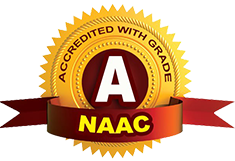Feedback from Stakeholders on Curriculum
Feedback Mechanism is essential to know whether the institute is reforming good performance and imparting quality education. Hence, the institute imparts policy to prepare feedback forms for different stakeholders to analyze the performance on different aspects. The Internal Quality Assurance Cell of the institute makes it a tradition to mandatorily collect feedback from stakeholders- students, teachers, employers and alumni. Institute collect and analyze the feedback received and provide suggestions to appropriate bodies so as to initiate the action for improvement.
Objectives
- The objective of the exercise is to correctly judge the impact of all the efforts taken by the institution at all levels on the various stakeholders. To maintain a current consciousness of the desires and forecast of students and stakeholders of the institute.
- Provides space for continuous enhancement of all products, services, facilities and procedures.
- Audit and enhance the aspects of students’ learning experiences through the timely collection, analysis and reporting of student feedback concerning teaching, learning and assessment.
- Providing students and stakeholders with the scope to actively participate in the continual improvement of programs of study by feedback collected on timely basics.
Methodology
- Feedback on teaching & learning process is collected from the students by uploading the Feedback Forms at the ERP. It is collected online and brought to the notice of AMC for analysis. Further suggestions are incorporated by head of the departments.
- Alumni Feedback is collected during alumni meetings & even online. The filled forms are sent for further action to AMC and then forwarded to concern higher authority
- Feedback is collected from teachers about the curriculum and improvement in the teaching learning process through the hard copy forms. The analysis is done of all collected feedback forms and handover the reports to concern higher authority for further action.
- Employers’ Feedback is also collected either in person or online for further action.
- The feedback committee collects inputs and suggestions from the stakeholders and further action to be taken is discussed with departments and authorities. The decisions taken by the authorities are forwarded for action to be initiated.
Analysis
- The data get compiled and analyzed by the members associated with the committee. It then goes for deliberation to the IQAC, AMC and the Governing Body.
- General Action Plan after data collection and analysis
- Annual Feedback Action Taken Report given after analysis of stakeholders’ feedback.
- Meetings are held at the department level, college council to discuss the suggestions and trends and feasibility of implementing the suggestions in the feedback.
- To make curriculum more effective certification courses, Value Added Programs were started and conducted.
- More activities planned for better results and holistic development.
- Cafeteria has been modified with all facilities at a new site.
- Internet facility with high bandwidth has been provided.
- Library hours have been extended
- Sports Activities have been enhanced.
Summary of Action Taken -> 2018-19 to 2022-23
- Annual Feedback Action Taken Report given after analysis of stakeholder feedback.
- Meetings were held at the IQAC level, Academic Monitoring committee and Governing Body to implement the suggestions in the feedback.
Activities conducted for better results and holistic development
- Result Analysis for students.
- Tutor Cell.
- Remedial Classes.
- Seminars and workshops.
- Interaction and Summer Internship at International Universities
- Projects & Internships.
- Industrial Visits.
- Sandipotsav: the Annual Social Gathering.
- To make curriculum more effective, various Add-On/Certificate courses were conducted.
- Induction Programs, Soft Skills Trainings, Group Discussions & Personal Interviews.
- Career Guidance & Job opportunities program.
- Social Outreach Activities.
- Elocution, Quiz & Debate.
- Entrepreneurship development programs
- Technical Festivals by each department association
Activities conducted for raising social consciousness
- Visiting old age homes and helping the inmates financially and interpersonally.
- Spreading Computer literacy for the differently abled, aged & students in orphanages.
- Empowering women and children in the neighborhood community as well as remote
- areas
- Conducting community development programmes
- Conducting disease awareness and prevention programmes
- Clean India-Green India
- Plastic reduction initiatives
- Gender sensitivity programmes
- Ganesha Idol Collection Activities
Activities conducted for promoting eco-consciousness and sustainability
- Distributing saplings to the students and teachers.
- Tree Plantation Drive
- Rain Water Harvesting
- Sewage Water Treatment Plant
- Tulsi Plantation
- Plastic reduction initiatives
- LED bulbs installation
- Solar Water Heater
- Waste Management initiatives10. Green & Environment Audit
Energy Audit

